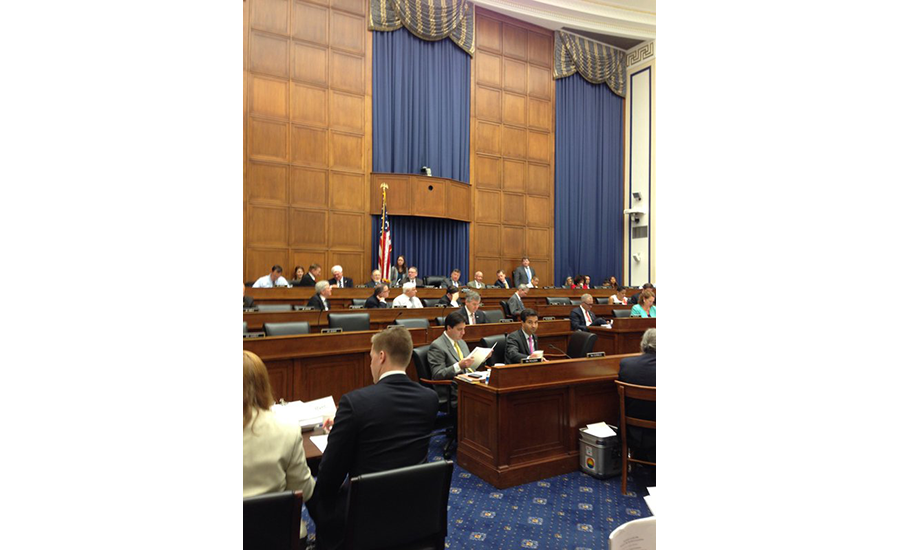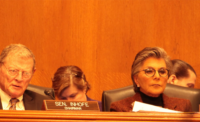A new water-resources bill has moved another step forward, with the House Transportation and Infrastructure Committee’s unanimous approval of a measure that authorizes $5 billion for 28 new Army Corps of Engineers flood-control, harbor-dredging, environmental and other projects.
During the committee’s voting session on May 25, Chairman Bill Shuster (R-Pa.) kept tight limits on the new Water Resources Development Act (WRDA), fending off proposed amendments that sought to widen the bill’s scope beyond the Corps to include such areas as wastewater and drinking-water programs.
The Senate Environment and Public Works Committee in late April cleared a more sweeping WRDA measure, totaling about $11 billion, which authorizes funds for Corps projects and also drinking-water and wastewater activities.
The next step for the two WRDAs would be floor action. Shuster told reporters after the committee meeting that he has been talking to House leaders about a possible slot for the bill on the House’s tight floor calendar. So far, he said, “We haven’t gotten a commitment on floor time.”
Shuster added, “But the good news is, we’ve passed something out of committee. The Senate has got something out of committee. So, we’re moving in the right direction to do something in this Congress.”
Mike Toohey, Waterways Council Inc. CEO, is optimistic about Congress's completing a WRDA bill this year. “We’ve got plenty of time to get it done,” Toohey said in an interview. But he added that, because of recesses in July for political parties’ conventions and the current legislative focus on appropriation bills, “I would suspect [WRDA will] probably be done later in the year."
Shuster said he wanted to keep the bill within the panel’s jurisdiction. Drinking-water issues, for example, are outside of its area of responsibility. “Keeping it focused, I think, is important, and we’ve been able to do that,” Shuster added.
Among the withdrawn amendments was a proposal from Rep. Eddie Bernice Johnson (D-Texas) to have the Corps fund abatement work or water-line replacements because of the presence of lead or other contaminants in drinking-water systems—a problem that has beset Flint, Mich. But after Shuster said he couldn’t support the amendment because the issue is outside the committee’s jurisdiction, Johnson pulled her proposal.
Similarly, Shuster opposed a proposal from Rep. Donna Edwards (D-Md.) to add a provision reauthorizing the EPA’s Clean Water State Revolving Fund program, which helps pay for wastewater-treatment-facility construction. But Shuster said the amendment “goes beyond the Corps civil works programs.” He also said he was “trying to keep this bill tight and keep it moving forward.” Edwards withdrew her amendment.
Shuster also blocked an amendment that clearly was Corps-related: a proposal from Rep. Michael Capuano (D-Mass.) to raise the federal contribution to 75% of the total cost for dredging harbors to 50-ft depths.
The 75% federal share now applies for dredging to 45-ft depths. The current federal share for dredging to depths from 45 to 50 ft is 50%. The Senate committee-passed version includes the provision, which the American Association of Port Authorities (AAPA) supports.
But Shuster said he opposed the proposal because of cost. He said Capuano’s amendment “would be putting enormous pressure on the [federal] general fund, resulting in funds being diverted from other business lines [such as] flood-control projects.” Knowing Shuster had the votes, Capuano withdrew his amendment.
Kurt Nagle, AAPA president and CEO, said one of the most important elements of the new WRDA is that it aims to return water-resources measures to a two-year schedule.
That was the general pattern in the late 1960s and early 1970s and again from 1986 to 2000. The last such measure was enacted in June 2014, but there was a gap of more than six years between that bill and its predecessor.
One controversial provision in the House committee’s WRDA is language to take the Harbor Maintenance Trust Fund off-budget, starting in 2027.
The provision’s supporters, including the committee’s top Democrat, Peter DeFazio (Ore.), say it would ensure the fund’s revenue would be spent on harbor dredging. But the bill specifies that the funds would be available “without further appropriation,” language that the House Appropriations Committee almost surely would object to as an incursion into its turf.
Shuster said he wasn’t the author of the bill’s trust-fund provision and noted that he hasn’t spoken to the appropriators about it.




Post a comment to this article
Report Abusive Comment